"Notting Hill" (1999): What Works/What Doesn't
It's Hugh Grant and Julia Roberts in their peak rom-com royalty dynasty era, capping their status as 90s Rom-Com King and Queen, respectively.
The Hugh Grant “El Niño” Effect is Not Lost on 90s Chicks
You couldn’t walk past a movie theater in the latter half of the 90s and early 00s without seeing the toothy, Eton posh, naughty man-child Hugh Grant plastered on a rom-com movie poster opposite some gorgeous popular female film star of the day. Whether it was the more life-affirming Four Weddings and a Funeral, his breakout film which had him lusting after a stoic and polite, some would argue emotion-less and unworthy-of-the-accolades Andie MacDowell (she has a similar role or dynamic with Estevez in St. Elmo’s Fire) or About a Boy, with a young Nicholas Hoult (Hank McCoy/Beast in X-Men), where he demonstrated a more mature and paternal presence, Grant proved he fit the bill for cerebral comedy.
He held our young women's fantasies of what an idyllic flawed romantic partner might look like - irreverent, witty, and self-effacing - and yet handsome enough to get away with it. That is, until he was caught in the 1995 oral sex scandal that tainted his reputation for a half-second, but didn’t kill his career by a long shot. After all, Grant never professed to be anything but a naughty boy and the public pretty much accepted him as such.
Furthermore, Grant had shown some remorse for his impropriety or at least produced a questionably preppy mugshot which in itself yielded embarrassment and was the butt of late-night talk show fodder for at least 6 months. Eventually, everyone moved on and a few years later, Notting Hill came out and all was forgotten. The “lewd conduct” was a blip in his career and a minor one at that.
I'm also just a girl, standing in front of a boy, asking him to love her.
Synopsis - Toothy American Celebrity Meets Equally Toothy Brit with Somewhat Crooked Teeth
🎞️ Notting Hill employs the commonly used trope of a “rich/powerful person” falling in love with a “normal person” or simply stated, celebrity and non-celebrity romance. Roman Holiday, The Bodyguard, and any rom -com/-dram featuring a fictional royal coupling up with a commoner are prime examples of such a set-up. The Princess Switch movies on Netflix featuring High School Musical alum Vanessa Hudgens have capitalized big-time on this craze.
In Notting Hill, Julia Roberts plays a well-known, affluent American actress, not unlike herself, named Anna Scott, opposite Hugh Grant’s Will, a middle-class bookstore owner in the trendy London neighborhood of Notting Hill, hence the film’s title. To fall for this film’s charm means to believe that the upwardly mobile Anna is “just a girl asking to be loved” as the quote above suggests. This line has been recycled so many times since 1999 and it’s probably the hokiest and least remarkable thing in an otherwise, pretty spectacular film that still holds its own a quarter of a century since its initial release. What renders the words shallow points to a larger plot problem, but more on that later…
In contrast to the lackluster of Scott/Robert’s “pick me girl” line at the end of the film, the opening montage of Roberts in her screen star glory set against the vocals of Elvis Costello’s “She” [Video] is arguably one of the most memorable mood pairings of cinema + song intros to hit the screen. It exudes old-school Hollywood grandeur, interlacing real-life film reels of Roberts at film events with the Anna Scott character’s press events for optimal cross-over effect. Its mindshare capture is seconded only to the equally as captivating intro voice-over narration by Hugh Grant’s Will at the start of the film. Both of these devices are expertly set up for maximum effect and the result is a seductive hook for viewers. We fall into the story without looking back.
✔️ Mood + Setting
Side Note: THE VOICEOVER EFFECT Hugh Grant’s character in About a Boy (Nick Hornby) is also named Will. I imagine it’s a fairly common British name so nothing too singular about this, but I mention it by way of connection to his character here. In it, Will is a quasi-celebrity who is left a large inheritance by the success of his father’s Christmas song and falls for the “normal” Rachel (Rachel Weisz). Will’s voice-over here is like the “leading man” technique used in Notting Hill and does much to fuel the Hugh Grant appeal.
Characters (That Work)
Hugh Grant as Will. Charming, self-doubting, and a fan of saying, “Oopsie daisy” when faced with climbing wrought iron gates with spikes. Can we blame him? Grant inhabits the character of Will in a thoroughly convincing way and he looks pretty damn good here.
Julia Roberts as Anna. Confident, world-weary, and equal parts bold and love-shy. Roberts is acting the role of herself to some degree but can toe the line, effectively persuading audiences that she is this other character, Anna Scott. It’s not an easy endeavor and she pulls it off. Also, her wardrobe in this is lit. She effortlessly transforms from Coastal Boho chic to a Woody Allen 90s film Betty (or Emily in Paris) to a Cottage Core Queen.
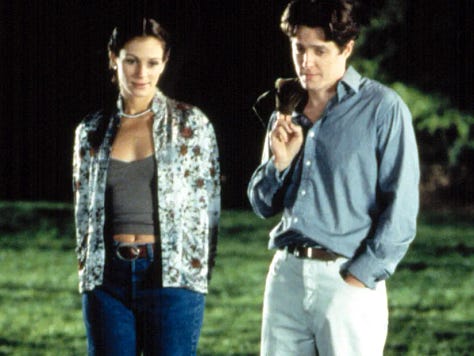
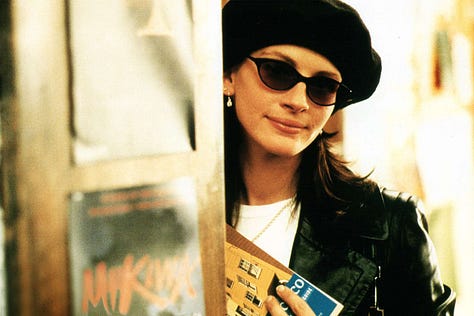
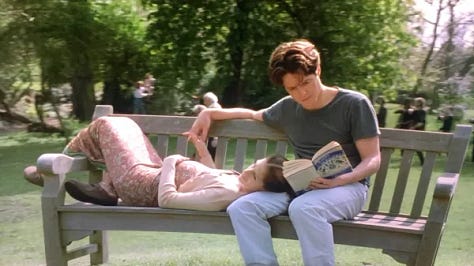
Rhys Ifans as Spike. I found Spike irritating the first time I saw this film, but in revisiting the film a few weeks ago, he was redeemed. He’s living large all the time here. He’s also sweet and seems to genuinely care deeply for Will. This scene below made me laugh out loud.
The Friends’ Gang - 1999 is the height of the Friends era. You have the famed NBC sitcom of the same name, Seinfeld, and we learn how vital besties are to the “com” element in the rom-com duality. Two years later, Grant would play womanizer, Daniel Cleaver in the first installment of the Helen Fielding Pride & Prejudice homage, Bridget Jones’s Diary (2001) which relies heavily on Bridget’s ride-or-dies to lighten the romance. Similarly, in Notting Hill, from which Bridget Jones’s Diary, takes a page, Will’s friends act to surround him with the necessary love and support friend groups should provide. In Notting Hill, the friends are admittedly less shallow. Will’s good friend had an accident from which she was paralyzed from her waist down, and the portrayal of her marriage is a model for Will, who must contend with his love obstacles in his romance and figure out a path forward.
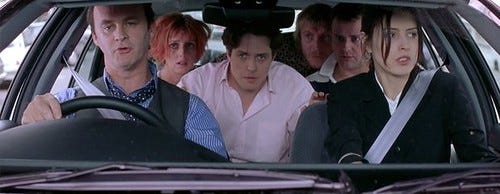
Subplots (That Didn’t)
The Credibility of Anna’s Love for Will - Anna walks into Will’s bookshop. She’s immediately drawn to the fact that he doesn’t recognize her and sees her as a regular person. They share a funny moment in which Anna’s personality, beyond her celebrity, comes out to play. It involves a shaming incident with a bookstore thief. Will recommends a travel book about Turkey that involves a lot of reading. She opts for the one with the pictures. Anna ends up in Will’s apartment after he spills coffee on her. After spending some awkward time together in the apartment, with some chemistry happening, but not a ton since it’s mostly Will verbally vomiting from nerves (“Honeyed apricots anyone?”), she later kisses him before leaving his flat. From there on out, they each get to know one another, but she leaves him twice, leaving Will spinning in a downward spiral. Finally, at the end she comes back to the bookstore and gives the famous, “I’m just a Girl” speech which made me want to play No Doubt’s “Just a Girl” so I will below.
Let’s Discuss
Are you a Hugh Grant fan? If so, what are some of your top Grant films? I can’t help loving him as an oompa loompa in the most recent Wonka or enjoying his Grumpy Grandpa shtick. It’s refreshingly curmudgeon. Then again, he was delightfully sinister in the Max (But really, HBO) series with Nicole Kidman, The Undoing. [Link here]
What Roberts films are tops for you? Mystic Pizza, Pretty Woman, My Best Friend’s Wedding and Stepmom all rank high in classic Roberts films f, or me.
Any subplots for you that don’t work?
Am I overly critical of the love plot being the weakest element? Thoughts?
This soundtrack is INCREDIBLE. It’s LIT. I listened to this soundtrack on repeat. Check it out:


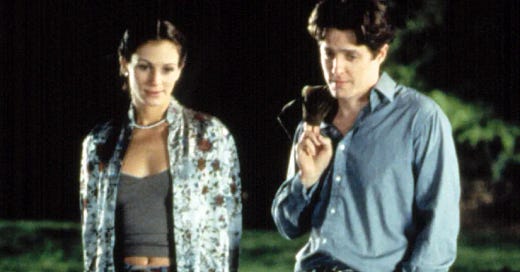




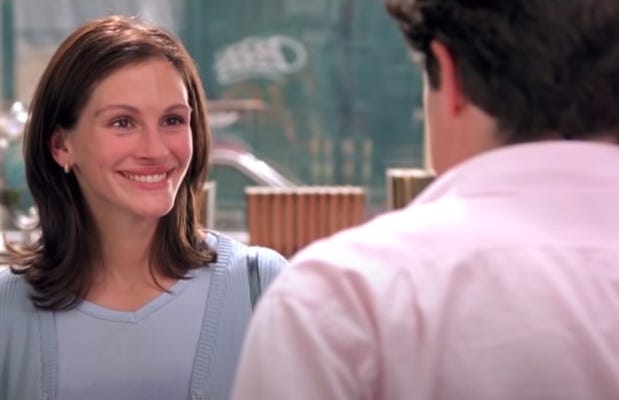

Great review. You pointed out some things I hadn't noticed, and I've seen it many times. I love that soundtrack too, almost think it makes the movie. The going through the seasons scene is also something that thrills me every time I see it.
I agree that the romance doesn't quite work, and for me it was that I never took to the Anna Scott character. Since I usually love to watch Julia Roberts, I overlooked that. But it was Will's relationship with family and friends that really made it for me. Same as in Four Weddings and a Funeral, where I didn't like the Andy MacDowell character that much.
But I'll watch Hugh in almost anything, love Paddington 2, Bridget Jones, The Undoing -- he's almost better playing baddies, although I like all his romcoms too.
This is one of my husband's favorite rom-coms, but I'm with you - I don't think the rom part actually works. I think it's a perfectly mid story with two really charismatic leads.